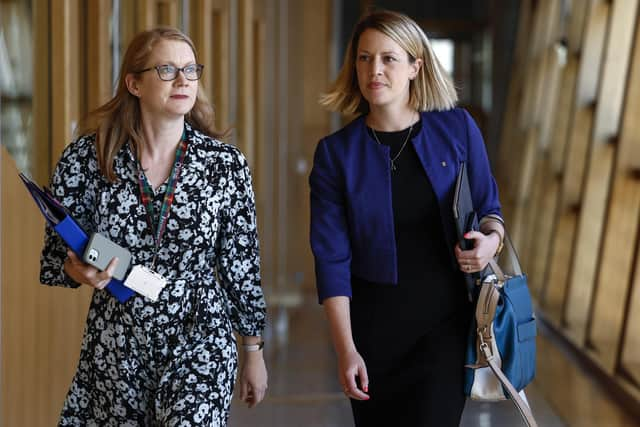Education Scotland: Documents expose SNP 'dither and delay' over £250m fund to fix crumbling schools
Documents have exposed the “dither and delay” at the heart of the Scottish Government over a decision on allocating £250 million to fix crumbling schools across the country.
Local authorities were initially promised they would find out before the end of 2022 which projects would win crucial financial backing from the third and final phase of the £1 billion learning estate investment programme (LEIP).
Advertisement
Hide AdAdvertisement
Hide AdHowever, after a series of delays, councils had to wait until the end of October 2023 to be told the news, by which point there was less money available than initially expected and the cost of building projects had rocketed.


Meeting notes released to The Scotsman under freedom of information (FOI) laws show that in December 2022, the former Education Secretary Shirley-Anne Somerville told officials that she “did not wish to rush” the decision.
They agreed to push it back initially until January 2023, but then no announcement was made.
By February 2023, the documents show officials were discussing options with Ms Somerville, including to “look further at the potential impact of a longer delay of the overall announcement on delivery and planning of the projects”.
Councils were eventually told in March that the Government was still considering which schemes to award funding.
The process is thought to have been further complicated by the resignation of former First Minister Nicola Sturgeon and the subsequent SNP leadership contest.
After taking over from Ms Somerville at the end of March, Jenny Gilruth said in April that she was “committed to announcing the successful projects by June”.
She later changed it to the end of the parliamentary session, but the deadline was missed again.
Advertisement
Hide AdAdvertisement
Hide AdMs Gilruth told The Scotsman in August that there had been a delay because First Minister Humza Yousaf and Deputy First Minister Shona Robison “wanted conversations during the summer recess to reassure themselves of where we were”.
By that point, however, concern was growing about the safety of public buildings, particularly schools, containing reinforced autoclaved aerated concrete (Raac), a collapse-prone construction material.
It emerged that several schools awaiting refurbishment or replacement as part of the third phase of LEIP also contained Raac.
In early September, after Raac had hit the headlines following the closure of schools in England, Mr Yousaf announced in Holyrood that a decision on LEIP would be announced “imminently”, but that the Government was now seeing the programme “through a Raac lens”, signalling that schools with Raac would be the top priority.
Meanwhile, a briefing note released under FOI shows that there had to be “adjustment” to 20 school building projects previously announced during the first and second phases of LEIP.
It is understood inflation and “market volatility” meant extra money had to be diverted from phase 3 to shore up schemes already under way, with the overall amount remaining eventually falling from an anticipated £295m to somewhere between £225m and £250m.
By the time the Government finally announced which projects would get funding on October 30, there was only enough money to support plans to develop 10 new schools across the nation, with more than 20 losing out.
The successful schemes included replacements for three schools containing Raac – Forres Academy in Moray, Hazlehead Academy in Aberdeen, and Riverside Primary in West Lothian.
Advertisement
Hide AdAdvertisement
Hide AdThree additional support needs (ASN) schools also secured funding – Lochies ASN School in Clackmannanshire, Carrongrange ASN School Extension at Falkirk and Kirkwall ASN Centre in Orkney.
The other winning bids were for Mull Campus in Argyll and Bute, Lenzie Academy in East Dunbartonshire, Chryston High School extension in North Lanarkshire, and Brae Campus, Shetland.
Highland Council, which lodged bids for five developments, was awarded no money from the LEIP’s third phase, and has since considered declaring a “school estate emergency” because of the scale of the infrastructure problems in the region.
At the other end of the country, a long-awaited refurbishment of Dumfries Academy faces uncertainty after missing out on funding.
There was also no money in the third phase to support bids from Aberdeenshire Council, South Lanarkshire Council, Fife Council, Dundee City Council, Renfrewshire Council, East Ayrshire Council and East Renfrewshire Council.
Responding to the documents released by the Government under FOI, South Scotland Labour MSP Colin Smyth said: “These exchanges lay bare the dither and delay at the heart of this dysfunctional SNP Government.
"Ministers consistently told parliament they would meet their own target dates for decisions but continually failed to do so.
"The consequence was councils having to put plans to fix schools on hold for years while they waited for announcements and fewer projects are ultimately being backed because costs have spiralled upwards during those delays.”
Advertisement
Hide AdAdvertisement
Hide AdHe added: “With more cuts in budgets, councils will now face the dilemma of having to find the extra funds to fix those schools that missed out on Government funding due to rising costs or simply axe the projects altogether and that will leave more pupils and teachers in schools that are simply not fit for purpose.”
A Scottish Government spokesperson said: “Since 2007, the number of schools in ‘good’ or ‘satisfactory’ condition has increased from 61 per cent to 90.7 per cent.
"The third phase of LEIP will build on that progress and ensures every local authority which submitted a bid through the programme received funding.
“Inflationary pressures and market volatility as a result of factors like Brexit have impacted on a number of Phase 1 and 2 projects, meaning uplifts were provided to those councils to meet increased costs and it was necessary to ensure these factors were fully considered when finalising decisions on the third phase.”
Comments
Want to join the conversation? Please or to comment on this article.
